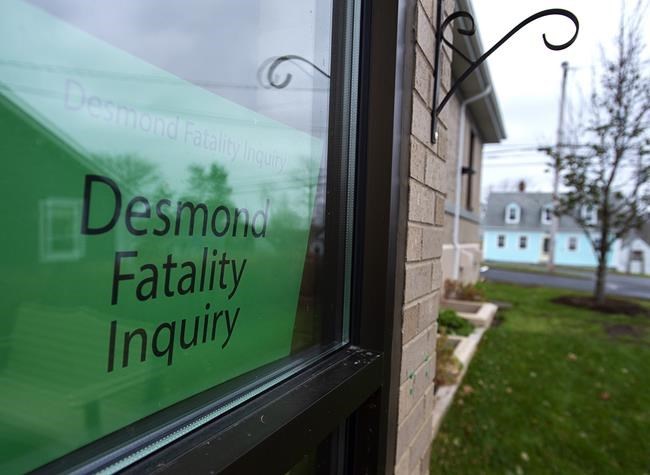GUYSBOROUGH, N.S. — Three hours before Shanna Desmond was killed by her husband, she sought information about how to get a peace bond, a fatality inquiry in Nova Scotia was told Tuesday.
The provincial inquiry, which started five weeks ago, is investigating why Lionel Desmond — a mentally ill former soldier — fatally shot his wife, mother, 10-year-old daughter and himself in the family's home in Upper Big Tracadie, N.S., on Jan. 3, 2017.
Nicole Mann, executive director of the Naomi Society in Antigonish, N.S., told the inquiry she received a call at 3 p.m. that day from a woman who gave no indication she was at risk.
"She didn't speak of any domestic violence," Mann said, adding that the call lasted about 20 minutes.
"She was articulate and straightforward. This person was not in crisis or distraught in any way .... There was nothing alarming about the call."
The non-profit group, which offers support to women and children facing intimate partner violence, often provides advice over the phone, but the group's policy is to keep the identity of callers confidential — unless the caller shares that information.
In this case, Shanna Desmond did not share her name but Mann could see it on her call display — a feature that has since been disabled at the organization.
Reading from a statement she gave police, Mann said she explained various options to the caller, including how to get legal advice and how to apply for a peace bond, a court order against someone who appears likely to commit a criminal offence.
Mann said when the woman mentioned her 10-year-old daughter, Mann made a point about asking about their safety and if they were at risk of being harmed.
"Her response to that was, 'No,'" Mann said. Mann also asked if the RCMP should be notified. Again, the answer was no.
As that point, Shanna Desmond mentioned that her partner was a former soldier who suffered from PTSD.
Mann said she learned about the triple-murder suicide the next morning when she received a call from a source at a partner organization, who relayed Shanna Desmond's name. Mann confirmed on her phone it was the same woman who had called the previous day, and there was a discussion among staff about privacy concerns before the RCMP were alerted.
Among other things, the inquiry is trying to determine whether the Desmond family had access to services to help with mental health and domestic violence, and whether the health-care professionals who dealt with Lionel Desmond were trained to recognize mental health and domestic violence issues.
Earlier on Tuesday, a New Brunswick doctor who specializes in treating veterans with PTSD apologized for comments he made about the Department of Veterans Affairs during testimony Monday.
Paul Smith offered a harsh assessment of how the federal department deals with those who are leaving the military for medical reasons, which was the case for Lionel Desmond in June 2015.
Desmond had been diagnosed with severe post-traumatic stress disorder and major depression in 2011 after he served in Afghanistan in 2007.
Smith told the inquiry that soldiers given medical discharges for PTSD are generally treated poorly by the department.
"Our PTSD soldiers are chastised," he said. "They are treated like lepers. They're cast to the wind. It's all about pills and psychotherapy. It's pathetic."
Smith apologized for those comments when challenged by a lawyer representing the federal government.
Lori Ward said the inquiry can expect to hear testimony from a Veterans Affairs case manager, who will testify how she tried to bend the rules to ensure the former infantryman received proper "continuity of care."
Ward said the woman is also expected to tell the inquiry that she volunteered to drive Desmond to the airport in 2016 when he was scheduled to take part in a residential treatment program at a hospital in Montreal.
"Does that sound like a lack of warmness to you?" Ward asked Smith.
Smith replied: "There's good people in the DVA system, and I apologize for a sweeping statement that may have presented otherwise. (However), it remains the attitude of many vets is that it's a constant struggle to deal with DVA in terms of attitude."
Smith's testimony was considered pivotal to the inquiry because he was the one who signed off on a medical form that allowed Desmond to purchase the semi-automatic rifle he used in the killings in 2017.
This report by The Canadian Press was first published Feb. 25, 2020.
— By Michael MacDonald in Halifax
The Canadian Press

